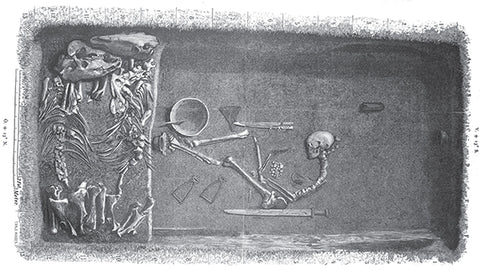It has for long been debated whether women fought as warriors during the Viking Age. Whilst there has been indications that they did, both in the sagas and in some archaeological finds, it hasn’t been confirmed by hardcore evidence – until now.
A new, ground-breaking DNA study made by researchers at Uppsala and Stockholm University is the first to present genetic evidence that the warrior profession was also available for women during the Viking era. We are in this blog post here summing things up and quoting the participating researchers from various Swedish media, since that is not available in English. The full report is published in English and is linked to further down.
"Written sources sometimes mention female warriors, but this is the first time we have found convincing archaeological evidence that they have existed," says Neil Price, Professor at the Department of Archaeology and Antique History at Uppsala University.
Grave Bj 581, located in the viking town of Birka, Sweden, was first described by Hjalmar Stolpe in 1889 and has since functioned as a model of what the grave of a professional Viking warrior would look like.
“It was automatically assumed that the warrior was a man throughout all these years.” says Jan Storå, Professor at the Department of Archaeology and Antique Culture at Stockholm University.
It contained all the trademark items of what is considered a high-ranking warrior, or even officer, such as a number of weapons, including a sword, arrows designed to penetrate armor and two horses. The grave also held a full set of Hnefatafl – a board game used to perfect strategy and tactics in war.

“The structure of some of the skeletal parts strongly suggested that it was a woman, but since the grave has been considered a male Viking warrior’s grave for over a Century, we needed to find a sure and secure way of determining the sex." says Anna Kjellström, researcher at Department of Archaeology and Antique Culture, Stockholm University.
The archaeologists therefore turned to genetics researchers to get the sex of the warrior confirmed. DNA from the skeleton was analysed and the result spoke for itself – it was a woman.
"This is the first time you can formally and genetically confirm a female Viking warrior." says Mattias Jakobsson, professor at the Department of Organ Biology at Uppsala University.

The female warrior was buried in Birka in the mid-900s. The isotopic analysis of the remains confirms that the woman led a life of travel, which fits well with the Viking warrior culture of the time and age.
"This is not a made-up figure from the sagas. What we have is a professional warrior, perhaps even a military leader, who happens to be a woman." says Charlotte Hedenstierna-Jonson, archaeologist and researcher at the Department of Archaeology and Ancient History, Uppsala University.
The study is part of the ongoing ATLAS project, a research program on Scandinavian genetic history, conducted jointly by Stockholm University and Uppsala University. The project is supported by the Riksbank's Jubilee Fund and the Swedish Research Council.
Read the official report in English publiced in the American Journal of Physical Anthropology: "A female Viking warrior confirmed by genomics”




Hail Odin
No surprise here. Female Viking period warriors have been documented before from measuring the bones, as I recall. A woman has wider pelvic bones than a man.
I find this very interesting…given my heritage ( 63%+- ) Norwegian…stateside.
Hinterlassen Sie einen Kommentar